Posts Tagged ‘World Relief Responds’
When Faith Leaders Join the Fight
Around the world, faith leaders are often trusted, respected and influential members of society. For decades, World Relief has seen the impact that working alongside faith leaders and communities can have in the face of natural and man-made disasters.
From the earliest days of the COVID-19 pandemic, we knew that the local church was uniquely positioned to support communities through this global disaster. However, it cannot be denied how challenging the pandemic has been for faith communities.
In Rwanda, frequent and serious lockdowns in the first year and a half of the pandemic prevented social and faith gatherings. Faith institutions were closed for months on end, rendering many faith leaders’ ministries and livelihoods a minefield to navigate.
At the same time, faith communities in many countries were largely left out of initial nation-wide responses to COVID-19, including vaccination rollouts. And yet, research has shown that religious factors are the third most frequently cited reason for vaccine hesitancy globally, making involvement of faith actors in COVID-19 vaccination efforts imperative.
Building on our existing work of empowering local churches to serve the most vulnerable, World Relief stepped in to fill these gaps.
Across the globe, we have equipped church leaders with prevention messages and, as vaccines became available, trusted information and training to help accurately inform conversations and decision making in congregations. What’s more, in places like Rwanda, we helped churches provide food and basic necessities to those most impacted by shutdowns.
Together, even as doors closed on church buildings, we were able to support pastors and churches to continue being the church during this crucial time of response. — mobilizing faith communities to care for the vulnerable in the fight against the virus.
Putting the Right Tools in the Right Hands
In Malawi, DR Congo, Kenya and Rwanda, much of our work to engage faith leaders and their communities in the fight against COVID-19 is happening in partnership with USAID through the SCOPE COVID-19 project.
Through SCOPE COVID-19, we have created and organized trainings for faith and community leaders on how to engage faith communities in dialogues promoting COVID prevention and vaccination. These trainings use story-based curriculum created by World Relief and designed to put trusted information in the hands of community and faith leaders.
Access to accurate and updated COVID-19 information has been especially important for people like Uwambajimana Marie Claire in Rwanda. As a prayer leader in her local church, she knew that people were looking to her for guidance on vaccines. “If I could not accept the vaccine,” she said, “no one in the group would accept it.”
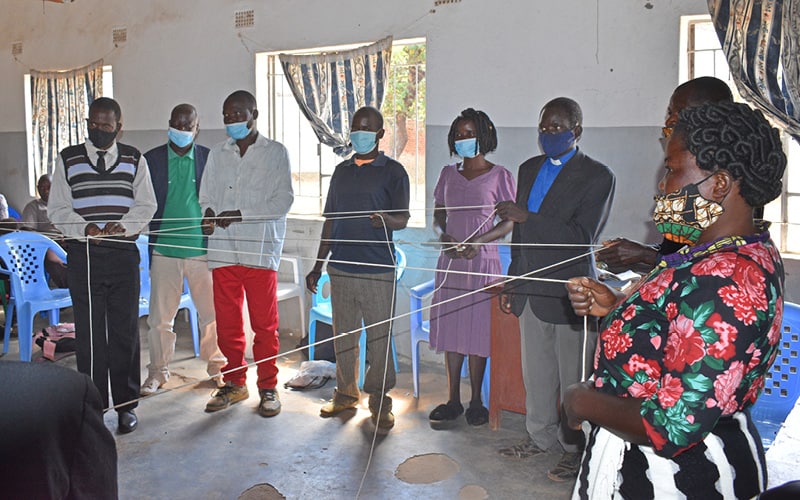
As in many places around the world, Marie Claire had heard frightening rumors about the COVID-19 vaccine. Distrust of the vaccine ran deep in her community, and she wanted to find out the truth. So Marie Claire prayed that God would reveal to her what was true.
When she participated in World Relief’s SCOPE COVID-19 training session on Risk Communication and Community Engagement, Marie Claire found answers to her prayer and to her questions about the vaccine.
“During the training,” Marie Claire said, “I heard that to fight against the pandemic, the vaccine is crucial. After hearing examples of many past pandemics that ended, resulting from vaccinations, and hearing the testimony of other believers who were vaccinated, I realized that I was headed in the wrong direction.”
Marie Claire decided to get vaccinated, and now she’s encouraging others in her community to join the fight against COVID-19 by getting vaccinated, too.
The World Relief COVID-19 curriculum used to train people like Marie Claire has been so successful at mobilizing faith communities at both the local and national level against COVID-19 that it has been adopted by the ministries of health in Kenya and Rwanda to be used by other partners throughout the countries.
Multiplying Faith Leader Impact
World Relief is currently working closely with over 11,230 local faith leaders through SCOPE COVID-19. As these leaders are equipped with accurate information, they’re driving conversations about COVID-19 in their communities.
Some leaders are leveraging regular radio talk shows and have reached an estimated 11,342,732 people across four countries so far. Others incorporate reliable prevention and vaccine information into faith gatherings or visit members of their communities door-to-door to share information and provide guidance.
Many congregants are reporting that the example of their faith leaders is building their confidence in the effectiveness of prevention measures and the safety of COVID-19 vaccines.
This is especially making an impact on vaccine uptake in these communities. To date, World Relief has directly supported the administration of vaccines to 241,590 individuals through SCOPE COVID-19.
One World Relief Rwanda volunteer shared that when vaccines first became available, they couldn’t find a single person in their faith community willing to get vaccinated. “[But] since faith leaders got involved,” they said, “it’s a different story. The church engagement in this fight has obviously made a tremendous impact.”
Leading the Way in Faith
Today, we are continuing to press forward alongside faith leaders in the fight against COVID-19 in Sub-Saharan Africa. Through SCOPE COVID-19, we’ve seen once again that faith leaders — when engaged consistently and intentionally at the national and local levels — can and will help their communities meet the needs of the most vulnerable.
Even as vaccination rates increase, the residual effects of COVID-19 remain devastating and the need for local communities of faith to act in love and mercy towards their neighbors remains high. At World Relief, we remain committed to equipping faith leaders around the world to lead their communities towards health, restoration and transformation.
Read more about our global response to COVID-19 and how you can help us care for those most affected by the pandemic.
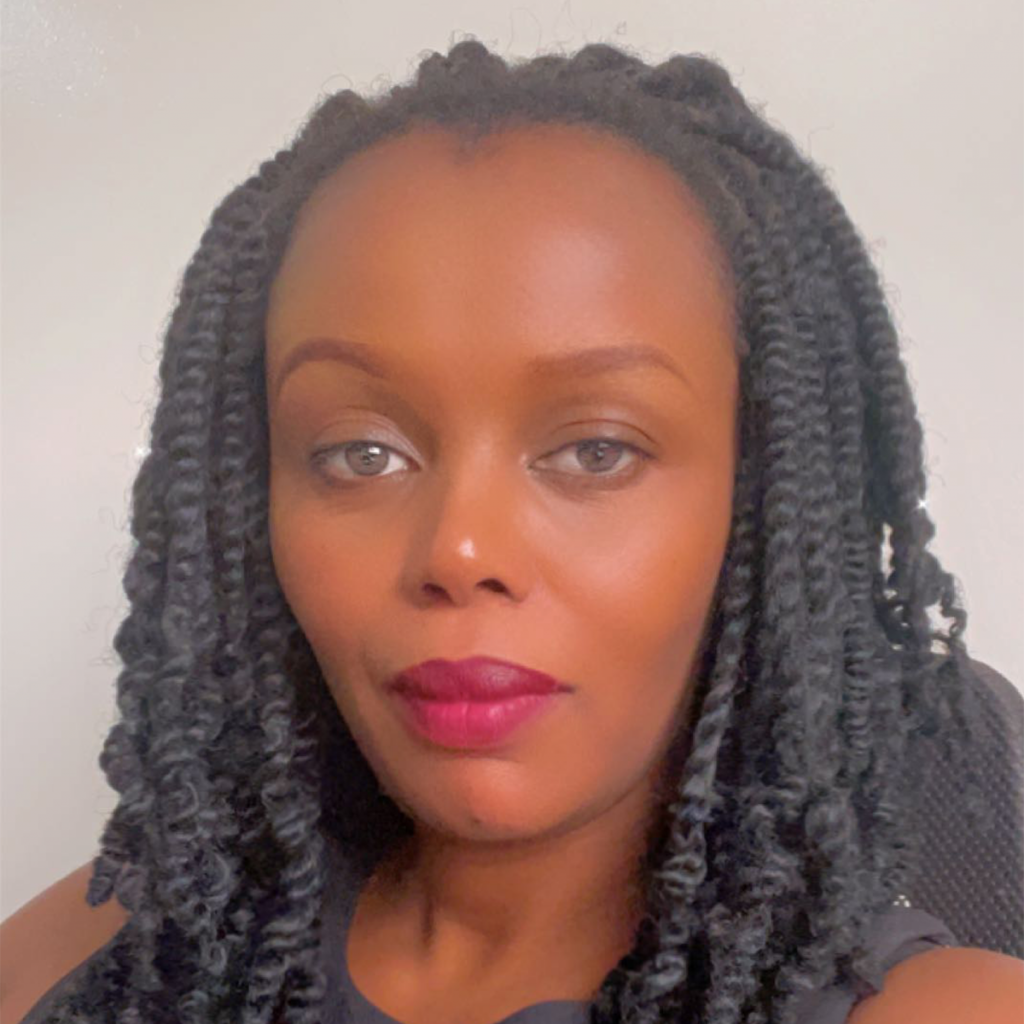
Sonia Karibagiza is a Rwandan Communications Specialist with 10 years of technical experience. She is passionate about educating the public and ensuring their safety. Since the beginning of the COVID-19 outbreak, she has been responding as a part of various teams implementing communication strategy under the Rwanda Joint Task Force on COVID-19, including managing World Relief’s SCOPE COVID-19 project in partnership with USAID until February 2022. As the project manager, she coordinated engagement of local leaders, health actors and faith leaders.
Rwanda Responds to COVID-19
It’s been a difficult season here in Rwanda. Like many places around the world, Rwanda experienced a total lockdown from mid-March to mid-May as cases of COVID-19 began sprouting up in communities across our country. Today, though some communities have begun to reopen, things have not completely returned to normal.
Most church buildings are still closed. Weddings can only have 30 people in attendance. Everyone must wear facemasks whenever we are out and about, and a country-wide curfew that begins at 7 p.m. and ends at 5 a.m. is still in place.
It’s been a difficult time, indeed, but the hardships and restrictions have caused us to think creatively and find new ways to serve the vulnerable and meet their evolving needs.
At World Relief Rwanda, we currently run programs in six different communities through what we call Church Empowerment Zones (CEZs). CEZs are networks of local churches that have come together to serve the most vulnerable. It is through these CEZs that we are able to offer programs in savings, gender equality and agriculture to name a few.
One such community is Nyamasheke District in Western Province Rwanda. Many of our staff who work in Nyamasheke live in a neighboring district that is currently still on total lockdown because of the high number of COVID-19 cases in that area. As a result, our staff are not able to leave their district to go to work in Nyamasheke.
In addition, many of the men and women in Nyamasheke rely on daily wages to meet their basic needs. But when the markets shut down, they had nowhere to sell their goods and missed out on that vital income. It’s been heartbreaking for myself and the rest of our team to see vulnerable people becoming more vulnerable.
But in the midst of this hardship, our team has been so encouraged to see local pastors from the Nyamasheke CEZ come together to continue serving the vulnerable in their communities. Although these pastors rely on the regular tithes and offerings that aren’t currently coming in due to churches being closed, they’ve banded together, mobilized their members and said, “We are going to do the best we can with the resources God has given us to really care for the vulnerable.”
Pastors like the ones from Nyamasheke have really stepped up by providing food to those who have not been able to make an income. Since March, churches from across the six CEZs served 4,056 families. In addition to these families, World Relief provided support to 1,346 families as well as support for 350 pastors and their families.
As we continue to adapt to this evolving situation in Rwanda, our team has drawn strength from scripture like this one found in 1 Corinthians 15:58 — “Therefore, my beloved brethren, be steadfast, immovable, always abounding in the work of the Lord, knowing that your labor is not in vain in the Lord.”
We’d ask that you continue to pray for us in Rwanda — for the health and safety of our staff as they carry out programs in compliance with social distancing measures; and for the pastors with whom we partner, that they would continue to discern and pursue God’s will in this difficult season.
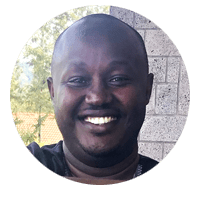
Moses Ndahiro serves as the Country Director for World Relief Rwanda. He is passionate about addressing the roots of human problems and unlocking people’s potential to fulfill their God-given purposes.
3 Neglected Global Humanitarian Crises
World Humanitarian Day
Every year on August 19, we celebrate World Humanitarian Day — a day that commemorates humanitarian workers who, despite all odds, continue to provide life-saving support and protection to those most in need.
Around the world, people suffer daily from extreme poverty, violence, famine, displacement and much more. At World Relief, we seek to serve the most vulnerable in these situations, confronting these complex humanitarian crises with innovative and sustainable programs.
Providing life-saving assistance during an emergency is just one way we get to be the hands and feet of Jesus. Today, we want to share with you some of the lesser-known crises going on in the Democratic Republic of Congo, South Sudan and Sudan where our staff are faithfully working to assist those most in need.
Food Security in the Democratic Republic of Congo
The Global Food Security Index has been ranking countries’ levels of food security since 2012, measured by affordability, availability, quality and safety in access to food. The Democratic Republic of Congo (DRC) has consistently ranked in the bottom four, with one in six residents facing hunger every day. In 2019, the DRC ranked #4, only preceded by Yemen, Burundi and Venezuela.
In Yemen, civil war is causing people to go hungry, in Burundi conflict over land resources is one source fueling the country’s perpetual poverty, and in Venezuela, political upheaval has caused massive countrywide inflation affecting the food prices. Yet these countries have not continuously ranked so low on the index the way DRC has. So, why is rampant hunger such an issue in DRC?
Armed groups hiding in the dense tropical forests provide one answer. They wreak havoc on local civilians. Congolese farmers are prevented from accessing their fields; whole villages are raided and sometimes burnt to the ground; gender-based violence has become the social norm, and mass internal displacement has disrupted food supply chains. What’s more, unceasing waves of Ebola outbreaks coupled with measles and now a COVID-19 pandemic has only added to the food security crisis.
Education in South Sudan
For Africa’s youngest nation, civil conflict broke out shortly after South Sudan gained independence in 2011, pitting ethnic groups and political parties against one another. As is often the case, children silently suffer the brunt of conflict. Yet sadly, education is often the most neglected sector in government and humanitarian response in South Sudan.
Prior to COVID-19, UNICEF estimated that 72% of South Sudan’s primary-aged children did not attend school, representing the world’s highest proportion of out-of-school children of any country. UNESCO put this number at 2.2 million children, with at least one in three school buildings non-operational due to war destruction, closure or being occupied by internally displaced persons or military groups.
When COVID-19 hit, the South Sudanese government closed down schools, much like other governments around the world. However, the lack of access to education has far more drastic and lasting effects in South Sudan.
The risk of physical and sexual violence increases as does child labor, sex trafficking, childhood marriage and army conscription. Food scarcity also increases as children lose access to school-provided meals, perpetuating the cycles of poverty and conflict and preventing this vulnerable new country from flourishing.
Political Unrest and Economic Insecurity in Sudan
In April 2019, Sudanese protestors peacefully took to the streets and removed former President Omar al-Bashir. Following the coup, a military-led council took power, prompting another series of protests which continue today. These protests aim to decrease inflation, implement greater civilian rule and reform laws that currently restrict freedoms.
Thus far, much progress has been made: alcohol consumption is allowed for non-Muslims, women can travel with their children without first obtaining the consent of a male guardian, female genital mutilation has been banned, and the crime of apostasy (a person’s conversion from Islam to another religion) has been abolished. Though these reforms signify positive change toward a more inclusive, democratic society, there is still much work to do.
Security forces have responded violently to some protesters, often resulting in death. Additionally, the economic problems at the root of the protests have made life difficult for the average citizen. Increased inflation rates often make it impossible to afford fuel and food, and widespread food insecurity has only been made worse by the presence of COVID-19.
US sanctions and a host of other factors have only exacerbated these economic issues. Sudan is on the U.S. Government’s list of State Sponsored Terrorism, a list that makes it difficult for Sudan to receive aid from international financial institutions, among other limitations. UN Attorney General Antonio Gutierrez has vigorously appealed for Sudan to be removed from this list so that the country can be reintegrated into the global economy, but to no avail thus far.
How We’re Responding
Though these situations can seem intractable, we believe the love of God and the work of His people can bring about lasting change in each of these countries. At World Relief we’re adapting to these constantly changing circumstances and finding innovative ways to serve our beneficiaries through humanitarian assistance and life-saving interventions.
In DRC, 3,500 farmers receive direct assistance in improved agricultural techniques, helping alleviate hunger for 164,000 individuals across three highly food insecure provinces.
In South Sudan, 50,000 students are educated through World Relief supported schools. Recently, one primary school in the Bentiu camp for Internally Displaced Persons ranked #1 in the country for primary student exam score results. During COVID-19, we continue to employ innovative approaches by encouraging student access to national radio learning programs.
And in Sudan, we’re providing malnutrition treatment to over 34,000 children under the age of 5 and pregnant women. We’re also giving agricultural support and food distribution for over 62,000 direct beneficiaries, and we’re further addressing economic crisis and resulting food insecurity by integrating livelihoods training throughout our programming.
Please join us in prayer for our brothers and sisters all over the world who suffer from various humanitarian crises. May we all see the hand of God at work even, in our darkest moments.

Lydia Dawson serves as World Relief’s Humanitarian and Disaster Response Unit Program Officer in Sudan, and in disaster response worldwide. Prior to joining World Relief, Lydia worked in homeless services and community development in Oregon and California. She is passionate about equity and honor for underrepresented groups, both locally and internationally.

Amanda Patterson serves as World Relief’s Humanitarian and Disaster Response Unit Program Officer in DR Congo and South Sudan. Prior to joining World Relief, Amanda worked overseas as a humanitarian responder to refugee and conflict emergencies in Niger, South Sudan, Greece, and Ethiopia with a large Christian NGO. She is passionate about helping others experience the beauty and diversity of God’s creation through art, nature and cultural engagement.
COVID and the Issues: U.S. Programs
World Relief currently operates local offices in 18 cities across the United States. Our teams are committed to helping new immigrants thrive by providing vital services and building communities of love and welcome. In addition to case management, our U.S. offices offer English language classes, job training and placement programs, legal services, youth mentoring, mental health services and more.
Prior to the COVID-19 pandemic, all U.S. programming took place in person. But in March, everything changed. As the country shut down, so did our physical office locations, and our teams were forced to find a way to bring their very interactive programming to a virtual space.
Today, in the fourth week of our COVID and the Issues series, we’re talking with Jennifer Foy, Vice President of U.S. Programs at World Relief. Jenn discusses the new needs that immigrants are facing in the wake of the pandemic and how our U.S. teams are adapting to meet those needs. In Chicagoland alone, the staff received 500 phone calls in less than a week from immigrants who had been laid off and needed help navigating unemployment and finding new jobs.
It’s been overwhelming and unprecedented. But, as Jenn discusses, the resilience and creativity that is being birthed out of hardship gives us something to hope for.
Come back next week to learn more about how COVID-19 is affecting food security and nutrition across the globe. To join us in addressing these issues visit worldrelief.org/covid-19.

Rachel Clair serves as a Content Writer at World Relief. With a background in creative writing and children’s ministry, she is passionate about helping people of all ages think creatively and love God with their hearts, souls and minds.
COVID and the Issues: Child Development and Protection
It is estimated that 85 million more girls and boys may have been exposed to either physical, sexual or emotional violence as a result of COVID-19, and as many as 30 million children’s lives are in danger of secondary health impacts such as exposure to deadly diseases like malaria, lack of immunizations and malnutrition as health systems are overwhelmed by COVID-19 patients. What’s more, millions more children are at increased risk of child marriage and child labor over the coming years as family livelihoods evaporate, pushing families to identify other forms of income that harm children.
Though the numbers are staggering, there is something we can do to reduce the number of children exposed to violence and ensure their communities are places where children can thrive.
Today, in the second of our six-week series, Covid and the Issues, we’re talking with Krystel Porter, World Relief’s Program Advisor for Child Development and Protection from International Programs. Listen as Krystel shares more about how our child development and protection programming is equipping communities to serve, protect and raise healthy, thriving children, even in the midst of a pandemic.
Come back next week to learn more about how COVID-19 is affecting food security worldwide and what we’re doing to help. And to join us as we fight back against the residual effects of COVID-19, visit worldrelief.org/covid-19.

Rachel Clair serves as a Content Writer at World Relief. With a background in creative writing and children’s ministry, she is passionate about helping people of all ages think creatively and love God with their hearts, souls and minds.
COVID and the Issues: Economic Development
We know many of you are concerned about how World Relief’s programs and the vulnerable people we serve around the world have been impacted by COVID-19. It’s been reported that 500 million more people could be pushed into extreme poverty as a result of the coronavirus pandemic.
In the first of our six-week video series, COVID and the Issues, we talk with Courtney Purvis, World Relief’s Senior Program Advisor for the Savings for Life program. Watch as Courtney provides an overview of our savings group program and explains how this program is helping people weather the economic upheaval caused by the pandemic. We promise you will learn a lot, and we hope you feel inspired by the amazing work your continued gifts and partnership will make possible.
Come back next week to hear how COVID-19 is affecting children around the world and how our Child Development and Protection programming is adapting. To learn more about partnering with us as we address the COVID-19 pandemic and its effects on vulnerable people across the globe visit worldrelief.org/covid-19.

Mary Milano serves as the Director of Fundraising Content at World Relief.
COVID and the Issues
It’s been five months since World Relief first began responding to the COVID-19 pandemic. Our U.S. and International offices closed their physical office locations in March, and our teams began innovating new ways to continue serving the most vulnerable in the U.S. and across the globe.
In the coming weeks, we will be sitting down with leaders and program experts from across World Relief’s program areas to bring you an in-depth look at how our U.S. and international teams have adapted to serving their communities throughout this global pandemic. You’ll hear more on the issues of economic development, child development, health, gender-based violence, immigration, food security and nutrition.
To kick off this new series, we wanted to give you a bird’s eye view of the work that’s been happening over the last few months and why your continued partnership in response to the coronavirus is so vital.
The vulnerable populations we serve across the globe are the most at risk of increased hunger, poverty and violence as a result of the social and economic effects of the COVID-19 pandemic. In the coming weeks, the number of people struggling with life-threatening hunger could double, and 500 million more people could be pushed into extreme poverty. Continuing our international development activities is essential as this pandemic evolves.
Hear more from Myal Greene, SVP of International Programs at World Relief.
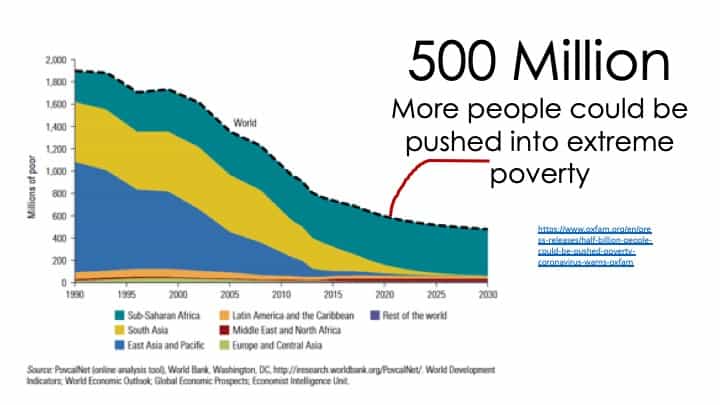
Just like in the U.S., it is now suggested that people wear cloth masks in many of the countries where we work. Our international teams and church partners are working hard to ensure the most vulnerable have access to face masks. Additionally, our teams are adapting their programs and utilizing their vast networks to make sure people have access to vital programs and services.
Hear more from Joanna Kretzer Chun, Director of Program Resources Team.
Listen as Joanna talks about how our international teams are utilizing their networks of church partners to reach thousands of people with important COVID-19 health information.
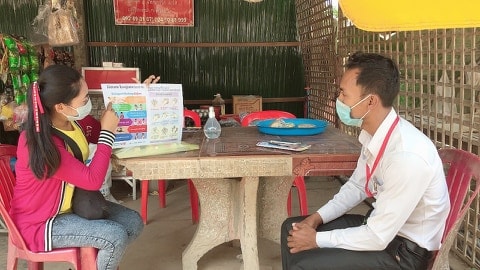
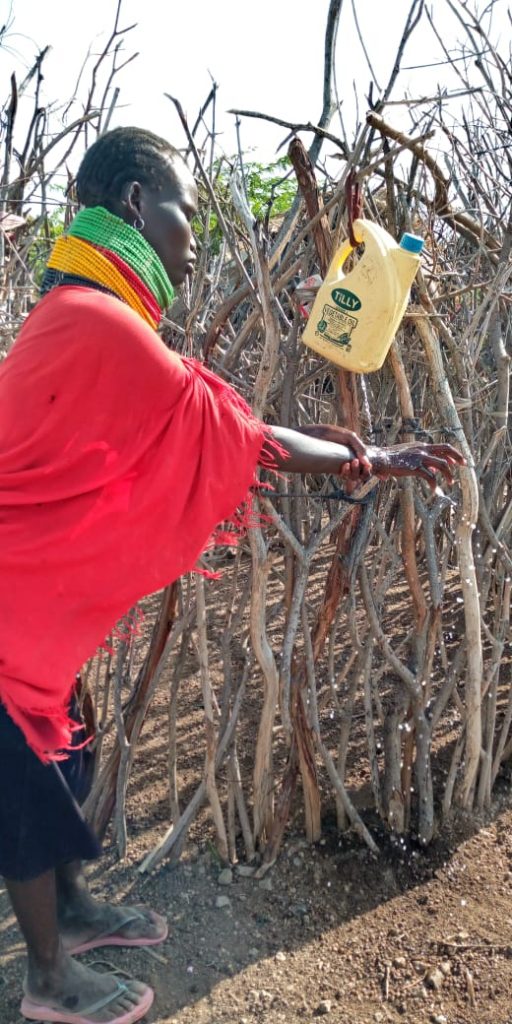
Disseminating accurate COVID-19 awareness and prevention messaging has been a key part of World Relief’s international response. Many of our teams have utilized text messaging platforms to reach hundreds of church leaders with clear and accurate information. In order to reach those living in more remote areas, our teams have had to get creative, using billboards, loudspeakers and radio stations to spread messages.
Hear more from Rhona Murungi, Senior Program Officer and International Operations Director.
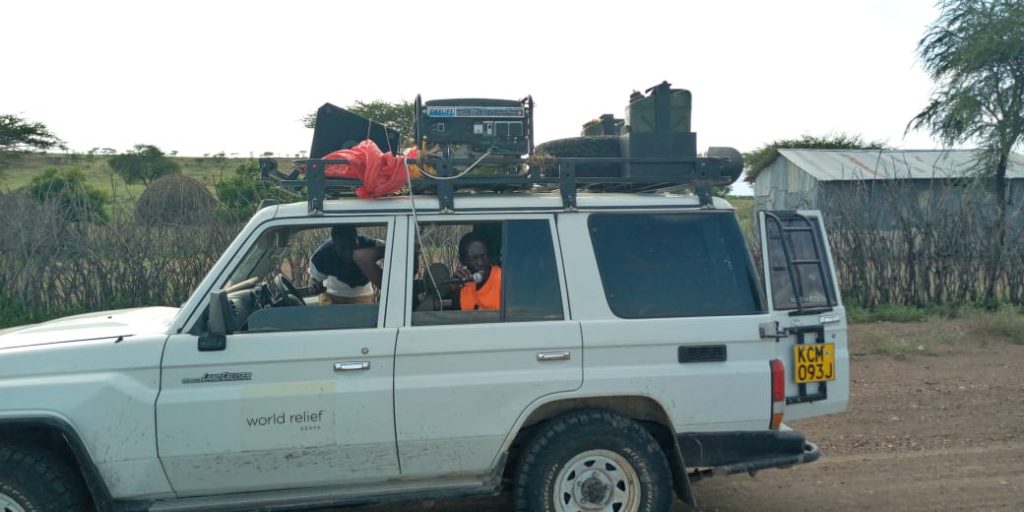
Listen as Rhona talks about the vital role that local churches are playing in reducing the spread of COVID-19.
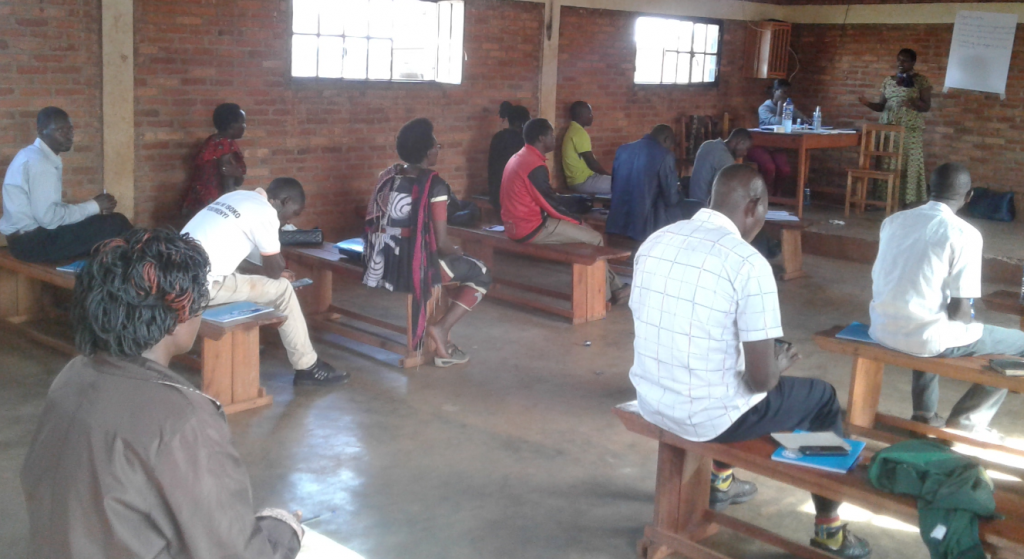
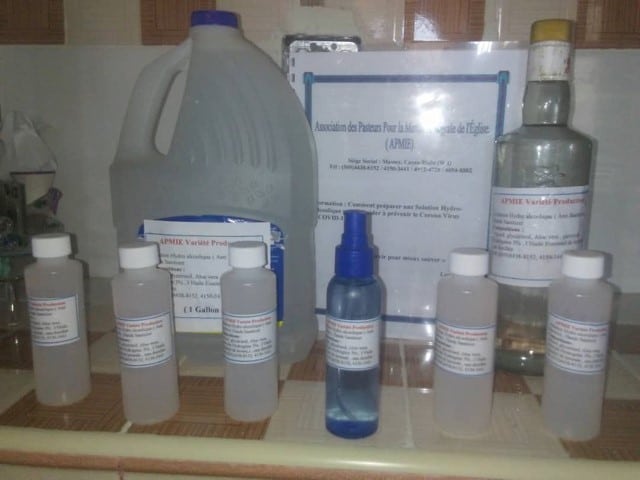
The negative effects of COVID-19 will be wide-reaching. The World Food Program has forecasted a famine of biblical proportions. The number of people facing life-threatening hunger could double in the coming months. Ensuring that affected communities have access to food has been a critical part of our international response.
Hear more from Charles Franzen, Humanitarian and Disaster Response Director.
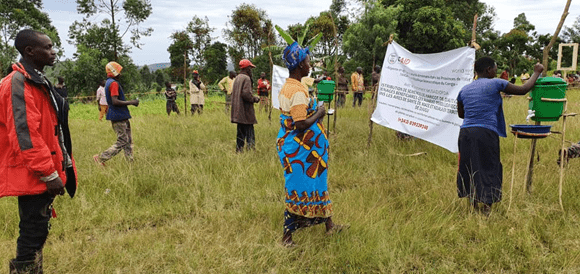
The effects of COVID-19 continue to impact our U.S. teams as well. Many of the immigrants we serve work in industries that have been hardest hit by layoffs and the economic downturn, and our teams are working hard to provide additional services to them during this time of need.
Likewise, with social distancing measures still in place in many states, our teams have continued to innovate by offering many of our programs online. Recently, two of our U.S. office directors wrote about the changes their teams made in order to keep serving immigrants in the U.S.
Read more from Tami McLaughlin, Director of World Relief Fox Valley, and Laura Fontaine, Director of World Relief Quad Cities.
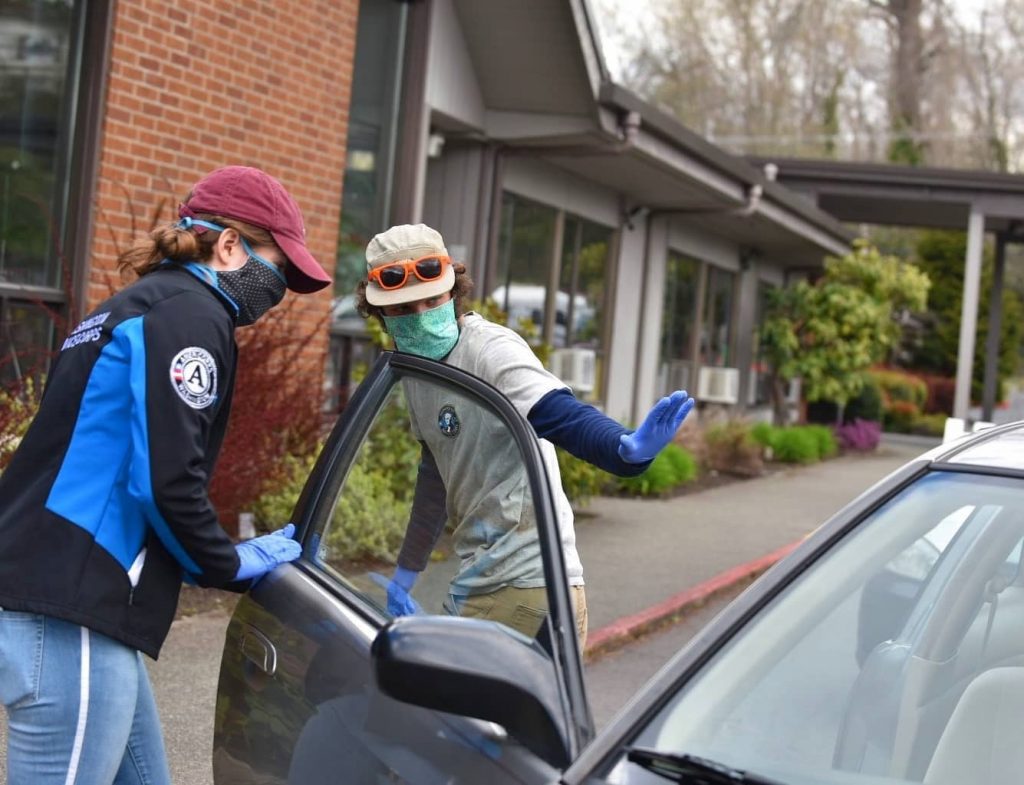

Rachel Clair serves as a Content Writer at World Relief. With a background in creative writing and children’s ministry, she is passionate about helping people of all ages think creatively and love God with their hearts, souls and minds.
It Takes a Village
It was 3 p.m. on a Tuesday afternoon when we got the call. A woman in the Congolese community had contracted COVID-19 — the first of what would turn out to be many cases for the Congolese living in the Quad Cities area. My mind raced with questions as we worked to determine the best plan of action: Does her family have everything they need? Does she understand what the word quarantine means? How many people has she come in contact with? Can we help her while also keeping our teams safe and socially distant?
We were able to connect with her on the phone and talk through the things her doctor had told her. We tried to ease some of her fears regarding the sickness and hoped this would be an isolated incident. Unfortunately, the virus had already started to spread, and over the next several weeks, 60% of the Congolese community would contract COVID-19.
The last several months have been a whirlwind as we’ve sought to manage all the unexpected challenges that have shown up in the face of this global pandemic. While our staff and volunteers have navigated their own challenges working from home, caring for kids and taking in the ever-changing and often confusing news cycle, our clients are even more confused than we are.
This situation is anything but ordinary. To have been forcibly displaced from your home is traumatic enough. But then to arrive in America only to face a pandemic and growing racial tensions can be shocking and isolating. Many of our clients have fled their home countries because of things like violence and ethnic and religious persecution. The events unfolding in America right now are fear-inducing for many refugees.
Similarly, most of our clients come from very high communal societies. Not being able to gather for worship, break bread together or visit a neighbor to help with child-rearing is a foreign and bizarre concept. It’s culture shock on a whole new level, and it’s why our team is so committed to regularly checking in on our immigrant clients and innovating new virtual programs in the midst of this crisis.
At World Relief Quad Cities, we offer a number of different services including Citizenship Classes, Immigration Legal Services, English Language Programs, Youth Mentoring and a culturally appropriate food pantry (meaning that in addition to fresh fruits and vegetables found in most grocery stores, our food pantry also contains many of the staples our immigrant neighbors would have eaten in their home countries).
Prior to the arrival of COVID-19, all of these services were offered in-person. Closing our physical office in mid-March meant we had to make major adjustments to our service model so that our clients could still access the resources they needed and feel connected to their new community.
Our citizenship classes were put on hold, and our food pantry transformed into a drive-through service. The second Monday of every month, around 300 clients pull up outside our office and we hand them a bag of food through their car door. For clients without cars, we deliver the food directly to their homes.
Likewise, our English classes and youth mentoring programs have become a hybrid of online learning mixed with work packets that we put together and deliver to our client’s homes. The packets include fun activities that families can do together to learn English. We send out new packets every two weeks, and we have been incredibly grateful for the ways our volunteers have stepped up to serve in these new ways.
These last three months have been a challenge I never imagined I would have to endure — working remotely alongside my husband who is also working remotely, trying to homeschool three kids while also making sure everything at World Relief Quad Cities stays on some sort of a normal schedule has been a lot to handle. But right alongside these challenges I’ve seen hope, strength, resilience and community rise up, and as a result, we’ve been able to establish new partnerships that may not have happened without the forced need of COVID-19.
The Rock Island Health Department has come alongside us to develop COVID-19 messaging to help educate our immigrant communities. UnityPoint Health has partnered with us to assemble and distribute boxes of masks, gloves and cleaning supplies to our clients in need. We’ve collaborated with Community Health Care to organize a COVID-19 testing site, and we’ve been awarded funds from organizations that have never donated to World Relief before. Those funds will allow us to reach more immigrant and refugee families with important COVID-19 information.
There’s an old Nigerian proverb that says, “It takes a village to raise a child.” I think the same holds true for a non-profit organization like World Relief. It truly takes a whole community to support and serve the most vulnerable — especially in times like these when sickness and the realities of racism threaten the new foundation our immigrant neighbors are trying to build. The generosity we’ve experienced throughout this pandemic has been nothing short of a miracle, and my hope is that refugees and other immigrants in our community experience it as a sign of love and welcome amidst the chaos.
Our church partners have been beyond generous, awarding us with grant money from their endowments and donating extra funds for the food pantry. We had a volunteer ask for bikes on social media and within two days we were able to deliver over 30 bikes to families in need of safe transportation. We also had a generous group of teachers from the Rock Island Head Start program gather money to purchase food for several of our families who recently lost loved ones in a tragic car accident.
As we move forward into a season of reopening and all of the unknowns that come with it, my hope is that morale remains high and our commitment to one another remains strong regardless of what comes our way. I pray that my team would know how valuable each of them are and how grateful I am for the unique contributions each of them brings. I pray our clients would know that we will be here with them through every step of this journey. And I pray that the church would rise up in its commitment to the most vulnerable, remembering that true greatness comes when we lower ourselves to lift others up.
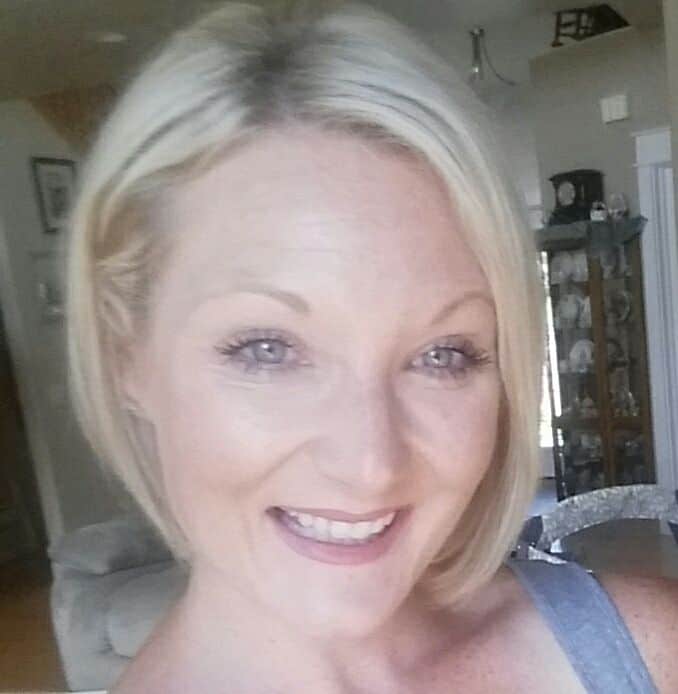
Laura Fontaine is the Director of World Relief Quad Cities and has been working with World Relief since April 2018. Laura grew up in various countries throughout Eruope as an Army Brat, which ignited her passion for working with and serving people from different cultures. She went on to study abroad in London, conduct research on development and security in South Africa and teach diplomacy and economics at the college level in China. She holds a B.A. in International Relations and History, and an M.A. in International Security and Arms Control with an emphasis in Strategy.
Voices from the Field: COVID-19
Over the last several months, our International Country Directors have recorded video messages to update us on how things are going for their teams and beneficiaries and to encourage those of us living in the U.S. In times like these, we are grateful for technology that keeps us connected as we weather this pandemic together.
You can view their messages below.
Updated on May 5th
Democratic Republic of Congo
“Nothing is impossible with God.” – Jean Nyandwi
Currently, DR Congo has nearly 2,000 known cases of COVID-19, and the number continues to rise. Country Director, Jean Nyandwi, recently connected with some of our U.S. staff and church partners to update them on how Congo was dealing with the growing crisis.
Early on, Jean and his team took advantage of an already planned agricultural program to spread COVID-19 prevention messaging to over 4,291 people. The team continues to spread virus prevention messaging by utilizing our vast network of church partners and program participants. Though the threat of the virus is still very real, Jean offered some words of encouragement at the end of his call. Watch the video below to hear what he had to say.
Updated on April 8
Kenya
“Together, we are still making an impact.” – Elias Kamau
Kenyans are very relational people, and like many in the U.S. they look forward to the day when social-distancing is a thing of the past. Country Director Elias Kamau sent us an update asking for prayer and outlining the ways World Relief Kenya is adjusting its programs, partnering with the Minister of Health and utilizing its network of churches to reach thousands of people across Kenya.
Updated on March 27
Rwanda
“This is my prayer for you. And I ask that you continue to pray for us too.” – Moses Ndahiro
In March, Rwanda issued a shelter-in-place order. Country Director Moses Ndahiro said that the team worked quickly to establish virtual offerings for some of their programs. Moses’ encouragement from Philippians 4 reminds us to continue with a posture of prayer as we move through the unknowns of this season.
Treasures in the Dark
COVID-19 is proving to be a deep, dark season. It was March 16th when we closed our office and began working remotely. The virus hadn’t yet hit the Fox Valley area so although our team was preparing, we weren’t really sure for what. We began praying, as individuals and as a team, for the refugee and immigrant communities we serve.
At World Relief Fox Valley, we serve 10 different immigrant communities and several hundred individuals per year. They come to us from Congo, Burma, Iraq and South Sudan, just to name a few. While we don’t know every person’s specific story, we do know that all have persevered through unimaginable circumstances.
Many who have fled violence and poverty to come to the U.S. feel a sense of hope and opportunity when they arrive in the Fox Valley. No longer will their lives be measured by their ability to survive. Instead, opportunity has been restored, positioning many of them to thrive. Education, home ownership, business ownership — these new possibilities excite them, and they are eager to succeed and give back to the communities that have welcomed them.
While the immigrants we serve face many challenges in achieving these dreams, it didn’t take long for us to realize COVID-19 would only add to the complexity of their lives and delay their journeys forward. Though our newcomer friends have overcome insurmountable obstacles, this uncharted territory posed a unique set of challenges for them to navigate.
I remember thinking in those first days of the crisis, “It’s hard enough for Americans like me to wade through the ever-changing COVID-19 information. I can’t imagine trying to understand it in a new language and in a new home with new laws that I was still working to understand.”
With that in mind, in an effort to mitigate confusion and connect with those we serve, our team began reaching out to our clients shortly after we closed our office. We started with adults over 50, those who weren’t yet fluent in English and others we knew to be most at risk in these circumstances. We made phone calls and sent texts, asking people if anyone had gotten sick or if they needed anything. We also wanted to let them know how much we cared about them.
Initially, their responses were nonchalant and unaffected: “This text is to let you know that everybody in the (Burmese) community is doing well and staying safe,” one response read.
And so, we continued praying for their health and safety. Our prayers were answered with a resounding ‘yes’ for a while. But then we started hearing about refugees testing positive for COVID-19, families being quarantined and people being laid off. One of the first calls we received was from a group of people who all carpooled to the same worksite. They were all exposed to the virus and told to self- quarantine. We were able to ease some of their anxieties and offer a bit of hope by helping out with rent and groceries while they were quarantined.
That was just the beginning of the phone calls and requests for help we received. Our team moved quickly to support our clients in any way we could. We increased our outreach to ensure they were receiving accurate health information. We also began offering virtual services to help families navigate unemployment claims and understand stimulus check qualifications.
The work has been constant, a load that has weighed heavily on our team as we navigate our own uncertainties. Yet, in the midst of it all, I have been constantly reminded of God’s promise in Isaiah 45:3.
“I will give you the treasures of darkness, riches stored in secret places, so that you may know that I am the Lord, the God of Israel, who summons you by name.”
God has indeed gifted our team with treasures in this dark time. Our community of donors has given so generously, allowing us to provide financial assistance for those most affected by COVID-19. I’ve received so many messages from donors saying things like, “We wanted to share our stimulus money with organizations we support. Thanks so much for all you do.”
Messages like these give our team the fuel we need to continue this vital work.
Likewise, our volunteer community has been a treasure. They have donated masks, purchased and delivered groceries, coordinated video chats with clients to help them stay connected and visited nearly every market in Fox Valley in search of ugali, a favored staple of our Congolese population.
Then there is the community of local churches that have donated offerings, gift cards and prayers. The generosity has been astounding. “I have a question,” one church partner wrote to me. “How are some of the people you’re working with handling all this stay in place’ stuff? Do you have a need for gas and grocery cards? I think I can get you some if you can give me a rough idea of what the need is right now.”
And the most treasured of treasures? A community of refugees and immigrants who remind us of what resilience and perseverance look like. They remain faithful and, by their example, demonstrate to our staff, donors, volunteers and church partners that even in the midst of darkness and despair, there are treasures to be found.
“I was just telling God,” one person from the Hispanic community we work with told me, “I do not know what I am going to do, you need to help me.’ And just when I finished praying, I received your call!”Our refugee and immigrant communities have endured hardships before, and they have come out stronger on the other side. So we continue praying — for health and protection for everyone within our community, and that we would keep our eyes peeled for the treasures to be found even in the season of COVID-19.
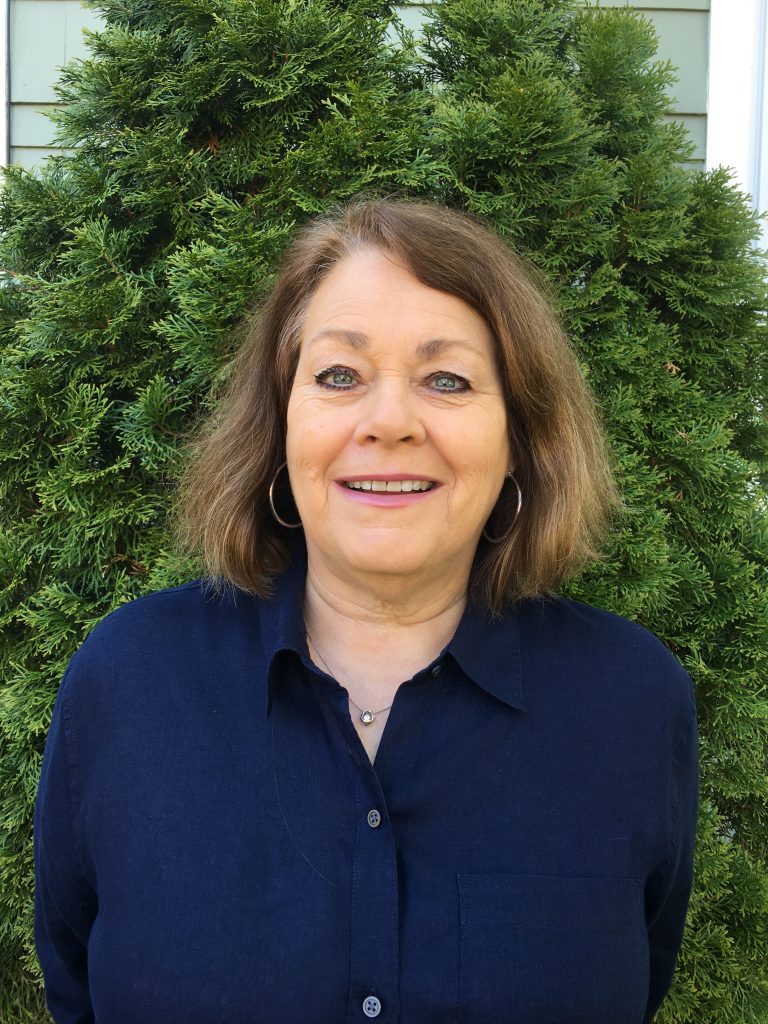
Tami McLaughlin first joined World Relief in 2014 as an Employment Specialist in Atlanta. Later that same year, she moved to Wisconsin to assume the role of Director of World Relief Fox Valley. Tami is passionate about developing service, fundraising and outreach programs and events and is dedicated to supporting the world’s most vulnerable.











